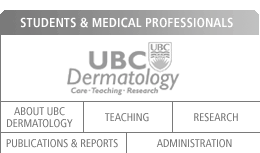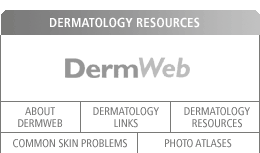|
|
 |
 |
 |
Psoriasis
Psoriasis is a chronic, non-contagious, lifelong immunologic skin disease that has been diagnosed in over 5 million adults in North America. It is characterized by inflamed skin that grows at an accelerated rate.
There are five main forms of psoriasis:
- Plaque - The most common, which appears as raised and red patches or lesions, which are covered with a silvery white build up of dead skin cells, called scale.
- Guttate - This form of psoriasis resembles small, red, individual spots on the skin, and these lesions usually appear on the trunk and limbs. These spots are not normally as thick or as crusty as lesions of plaque psoriasis.
- Inverse - Found in the armpits, groin, under the breasts, and in other skin folds around the genitals and the buttocks, this type of psoriasis first shows up as lesions that are very red and usually lack the scale associated with plaque psoriasis. The lesions may appear smooth and shiny, and are subject to irritation from rubbing and sweating because of their location in skin folds and tender areas
- Pustular - This manifest itself in white pustules or blisters of noninfectious pus surrounded by red skin, with the pus consisting of white blood cells. It is not an infection or contagious. This relatively unusual form of psoriasis affects fewer than 5 percent of all people with psoriasis and may be localized to certain areas of the body, and in a few cases can be generalized, covering most of the body. It tends to assume a cycle of reddening of the skin followed by the formation of pustules and scaling.
- Erythrodermic - This is an extremely inflammatory form of psoriasis that often affects most of the body surface, and generally appears on people who have unstable plaque psoriasis, where lesions are not clearly defined. It is characterized by periodic and widespread redness of the skin. The reddening and shedding of the skin are often accompanied by severe itching and pain.
About 10 percent to 30 percent of people with psoriasis also develop psoriatic arthritis, which causes pain, stiffness and swelling in and around the joints.
In general, Psoriasis can be treated with topical cream and ointments, ultraviolet phototherapy, or oral medication.
The Skin Care Centre offers a specialized Psoriasis Clinic.
« Back to Common Skin Disorders
modified 012408 |
|
 |
|

